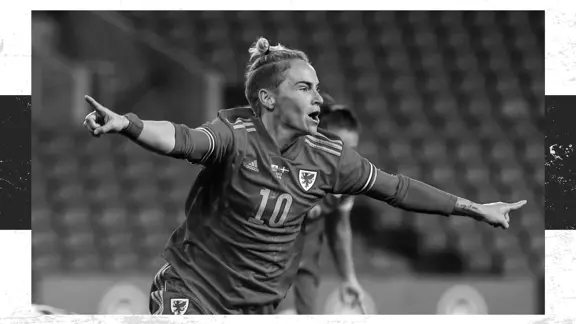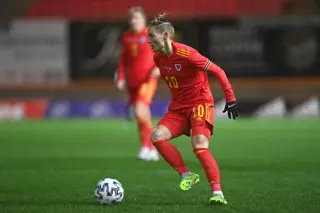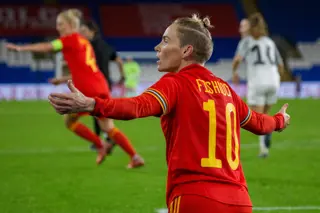Player Story
Jess Fishlock: "I know who I am, and I love who I am, and that makes it a lot easier to be myself"

When I decided to come out publicly on national television in my homeland, I knew that would send a little shockwave through our amazing little country. The reason that I decided to do that was because I kind of hit a point in my life where I just had enough. I had enough of hiding a part of me and just not ever feeling like myself.
Doing this was a way for me to kind of take control of my life, and live the rest of my life the way I wanted. It was a really big decision because obviously I have family and this was going to go public across Wales, where my family still live. They were really worried about a backlash, and what that would mean for in terms of representing my country. Representing my country is the biggest honour I can have, but by that point I didn’t care.
The biggest reason why I decided to do it was because I didn’t want anybody else to go through what I went through. I wanted to be visible so that kids who didn’t know what was going on with them or feel safe would have someone they could recognise and identify with. I didn’t want them to get to 23 like I did and not feel like they’ve lived a single day of their life.
I just wanted to enjoy life. Who doesn’t want to enjoy life, right? It’s what we all ultimately want - to be happy and be the best versions of ourselves, no matter what you do. Otherwise, what is the point? At that time, I didn’t feel like that was happening for me. I didn’t feel like I could do it, but I was fed up of the way I was living.
I have been publicly out for over a decade now. I’m asked if I feel accepted, and I kind of do. But can I say that it’s the same for everybody, and that everybody feels as I do? I don’t think so. I’m lucky that I’ve been doing this for a long time - I know who I am, and I love who I am, and that makes it a lot easier to be myself when I write down these words. Being comfortable in yourself is the biggest challenge, and it is a really long process.
The FAW (Football Association of Wales) took a long time to become more diverse. Our national team are a very open and proud group of players. For so long, I personally never felt like who we were was ever truly represented or supported. From the top of the organisation down, I never felt truly supported as human beings.

It’s really hard to have so much love for something, but also feel that way. So, over the years, our social platforms became the method of getting our message out there about who we really are.
Over the last three years or so, our association has taken a massive shift, and I think that’s because of our individual platforms and profiles being heard. They’re listening and they understand that we’re not just there to represent Wales on the pitch, but to represent our country in every other kind of way.
And what does that mean? It means that, yes, we want to talk about the difficult stuff, and we’re not going to hide who we are as people. We represent our country when we play football, and we’re going to represent everybody by being who we are.
This year was the first where we’ve had pride numbers on our shirts, pride armbands and flags too. This is the kind of progressive change from an organisation where I never felt it would happen. This kind of change can be led by players, but every organisation needs to recognise that the biggest changes have to happen at the top. People at the very top need to come down, spend time in the locker room and spend time with the players. Talk to us, understand exactly how we're feeling, why we're feeling it, and then make the appropriate decisions - that is the only way that you're going to make the right change.
A boardroom where there isn’t an understanding of what people are going through is always going to stop any growth, and progression.

In many ways, what has happened with us and our FA - it’s a success story. But it can’t end here. There’s been progress, but we must do better. We can say that we’re doing all we can, but it’s not enough. We really need to sit down and rethink what we can do to make our sport more inclusive, because although we’ve made progress, this is not enough. I’m 35 now. As I start to think about what my legacy would be when I finish, I want it to be less about what I achieved as a footballer, and more about I’ve done to help create change off the pitch. I want people to appreciate the work we did to make it so much better for everybody else.
I don’t really care about my on-the-field things, I’m kind of past that now. I just want to make this place better and safer for the next generations, and the generations after that.
That’s what I need to fulfil.
